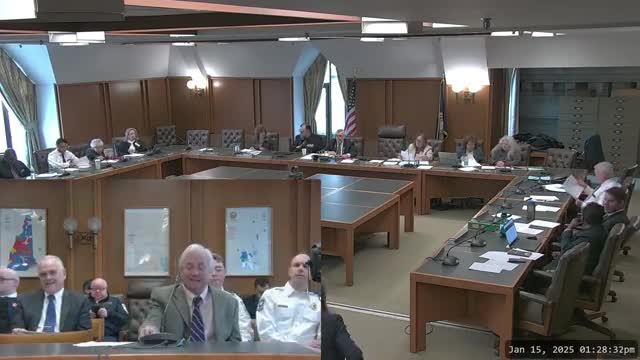Insurance department backs cost‑based fee schedule and ban on ambulance balance billing after actuarial study; providers warn rates are too low
Get AI-powered insights, summaries, and transcripts
Subscribe
Summary
Following an actuarial review, the New Hampshire Insurance Department recommended rules to set a cost‑based fee schedule for out‑of‑network ground ambulance reimbursement, prohibit balance billing of patients and form a commission to explore an all‑payer waiver. The proposal divides providers and payers and drew extensive public testimony.
Representative Tom Hunt introduced House Bill 3316 after the Insurance Department completed an actuarial study and a stakeholder summit. The department urged the committee to adopt a cost‑based, annually updated reimbursement schedule for out‑of‑network ground ambulance services, prohibit balance billing of consumers and create a commission to study an all‑payer model under a federal 1115 waiver.
Why it matters: Ground ambulance providers across New Hampshire report rising operational stress. The department and its vendor, PCG, concluded commercial payers currently reimburse near Medicare levels while providers’ cost structures require materially higher payments to close a funding gap. The committee heard competing claims about how large that gap is and whether the PCG schedule would be sufficient to maintain services.
Insurance Department proposal and PCG study Insurance Commissioner D.J. Bettencourt described a multi‑stakeholder ‘‘ambulance summit’’ and said the department commissioned an independent actuarial review to produce an evidence‑based rate schedule. The contractor, PCG, used provider cost reports and existing Medicare cost‑survey inputs to build a fee schedule that breaks charges into transport, treat‑no‑transport and mileage components, applies relative‑value adjustments, and adds rural/super‑rural cost factors.
The PCG schedule recommended a material increase in commercial reimbursement compared with today’s levels — the department characterized the recommended schedule as roughly doubling commercial payments in the aggregate and as a multiple of current Medicare rates (PCG presented figures in the hearing that the committee summarized as about 197% of Medicare on average, with an additional 20% ‘‘provision for adverse deviation’’ to allow for uncertainty).
Balance billing prohibition and enforcement Under the department’s draft rule approach embedded in the bill language before the committee, ground ambulance providers would not be permitted to balance bill insured patients for out‑of‑network shortfalls; instead a mandated schedule would govern out‑of‑network reimbursement and an independent dispute process could resolve provider‑carrier disputes. Bettencourt emphasized the proposal was designed to remove the patient from the middle of payment disputes.
Provider testimony: rates and survival concerns Multiple ambulance providers and association representatives said the PCG numbers understate their revenue losses and that prohibiting balance billing at the recommended rate would leave many providers short of necessary revenue; some witnesses pointed to other states that set higher multipliers (several cited 325% of Medicare) or to state subsidy responses. Providers warned closures would increase property tax burdens or reduce service availability in rural areas.
Carrier and consumer group perspectives Representatives of insurers acknowledged the consumer‑protection aim, but raised concerns about premium impacts and legal complexity. Witnesses and lawmakers noted Medicare and Medicaid set reimbursement for roughly 80% of rides; Bettencourt said the state’s bargaining room is limited and that pursuing a federal 1115 all‑payer waiver is one approach to align Medicare/Medicaid with the proposed schedule.
Options framed for lawmakers Bettencourt framed three options for the legislature: keep the status quo (continue balance billing and risk provider distress), adopt the department/PCG framework (increase commercial reimbursements, prohibit balance billing and remove the patient from disputes), or adopt a higher statutory multiplier that would likely raise premiums and possibly reduce coverage affordability.
Next steps PCG and Insurance Department staff offered to return in subcommittee with detailed methodology and to answer technical questions. The committee closed the public hearing and will schedule subcommittee sessions to review the actuarial work and draft rule language.
